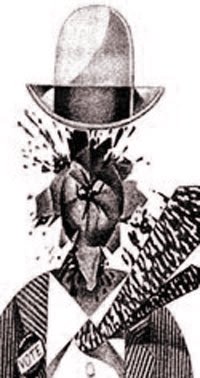
You run on issues that define the election as "us" versus "them." You use the campaign to rally your base and overwhelm opponents. You don't waste time trying to win over your opponents. Instead, you beat their brains out. Divide and conquer used to work for Republicans: Richard Nixon in 1972, George W. Bush in 2004. Now it's working for Democrats.
That's why Hillary Clinton is running to the left of her husband even though she isn't facing a significant primary challenge. Bill Clinton ran for president in a different era. In the 1990s, the Reagan coalition was still ascendant. Bill Clinton could take relatively conservative positions on welfare reform and crime and win back a lot of working class whites and white southerners. That's no longer possible. Those voters have become solidly Republican.
It's different now. We're in an era of identity politics. Voters don't support a party simply because they like its policies. They support a party because of who they are. If you're a southern white male or a devout Christian, you vote Republican. If you're an African-American woman or a young urban white person with a college degree, you vote Democratic. In either case, you can't imagine voting for the other party because "that's not who I am."
The traditional model of voting behavior was described by the great political scientist V.O. Key, Jr., 50 years ago. It required switching. Voters who, for any reason, were dissatisfied with the way things were going would switch their support, often temporarily, to the other party. That's possible only if the two parties are not that far apart. In an era of identity politics, switching has become much harder to do. Who you are is how you vote.
Campaigns are no longer about persuading the undecided. They're about rallying your base and demonizing the opposition. It's more like European politics, where partisanship is baked into your identity. At its worst, in countries like Lebanon and Iraq, an election is simply a census: the results reveal how many Shi'ites, how many Sunnis, how many Christians, how many Kurds, etc.
Identity politics was the rule in the United States after the Civil War. The division then was North versus South, not liberal versus conservative. Nobody talked about Independents. They were "the third sex," as in, "who needs 'em?" It was an era of closely contested national elections. So close that in two presidential elections, 1876 and 1888, the popular vote winner lost the electoral college. That did not happen again until 2000.
Today, once again, the country is closely divided. Look at the winning percentages of the national vote in the last four presidential elections: 48 percent, 51 percent, 53 percent, 51 percent. A frozen system with few persuadable voters and evenly matched parties produces a powerful incentive to campaign to the base.
Hillary Clinton is doing that. She condemns Republicans for imposing voting restrictions. She advocates an eventual path to citizenship for illegal immigrants. She wants to lower incarceration rates, which disproportionately affect minorities. She supports automatic voter registration when a citizen turns 18.
Is that a radical idea? The U.S. is one of the few countries that requires citizens to register to vote on their own initiative. In most other countries, it's the government's responsibility to keep the voter rolls up to date -- like the tax rolls. In fact, the U.S. didn't even require voter registration until the late 19th century. Registration requirements were passed as a way to combat rampant voter fraud by political machines. Today, Clinton accuses Republicans of "fear-mongering" about a "phantom epidemic" of voter fraud.
Republican candidates are also playing to the base. They all oppose what they call "amnesty" for illegal immigrants. They all oppose same-sex marriage. They can't seem to figure out what to say about Caitlyn Jenner. Those kinds of "traditional values" issues used to get Republicans elected. Now they blow up in their face.
Former Wisconsin Gov. Scott Walker likes to pick fights. He picked a fight with trade unions in Wisconsin and won. Now he's picking a fight with the state university. It's "us'' versus "them." To conservatives, unions and universities are "them."
The divide and conquer strategy may work, but it has a poisonous effect on our politics. It is highly divisive. It produces bitter campaigns and narrow victories with no strong mandate. (Both George W. Bush and Barack Obama got re-elected with 51 percent of the vote.) It's also risky. When you mobilize your own base, you risk counter-mobilizing the other party's base.
At the extreme, identity politics means that public opinion is replaced by party opinion. Voters line up with their party on everything. The U.S. hasn't reached that point yet. But the 2016 campaign doesn't seem likely to reverse the trend.


 Contact The Editor
Contact The Editor
 Articles By This Author
Articles By This Author
